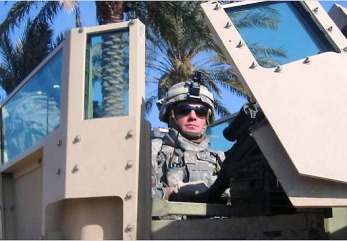In August 2009, Specialist Michael Crawford tried to commit suicide by way of a handful of painkillers with a chaser of whiskey. “It is just a dark place. Being in the W.T.U. is worse than being in Iraq.”

The W.T.U. is the Warrior Transition Battalion, “a special unit,” the NY Times writes, “created to provide closely managed care for soldiers with physical wounds and severed psychological trauma.” Once brimming with confidence, Crawford returned from a tour in Iraq suffering two concussions from roadside bombs. “The transition unit at Fort Carson, outside Colorado Springs, seemed the surest way to keep suicidal thoughts at bay, his mother thought.
“It did not work. He was prescribed a laundry list of medications for anxiety, nightmares, depression and headaches that made him feel listless and disoriented. His once-a-week session with a nurse case manager seemed grossly inadequate to him. And noncommissioned officers — soldiers supervising the unit — harangued or disciplined him when he arrived late to formation or violated rules.
“…many soldiers complained that doctors prescribed drugs too readily. As a result, some soldiers have become addicted to their medications or have turned to heroin. Heavy use of psychotropic drugs and narcotics makes it difficult to exercise, wake for morning formation and attend classes, soldiers and health care professionals said. Yet noncommissioned officers discipline soldiers who fail to complete those tasks, sometimes over the objections of nurse case managers and doctors.
This is a heartbreaking story. And another in a list of stories that goes back to the 2007 scandal at Walter Reed Hospital where there were numerous cases of mismanagement and neglect. Warrior Transition Units were created to specialize in helping those soldiers with acute, stress-related issues. However, “at least four soldiers in the Fort Carson unit have committed suicide since 2007, the most of any transition unit as of February, according to the Army.”
In an interview for the Times, Lt. Col Andrew L. Grantham, commander of the W.T.U. said, “These guys are still soldiers, and we want to treat them like soldiers,” Grantham said that in some cases, soldiers feel ashamed of needing treatment.
“Some come to us with an identity crisis,” he said. “They don’t want to be seen as part of the W.T.U. But we want them to identify with a purpose and give them a mission.”
Reading this story reminded me of the work of Chief of Thoracic Surgery with the 24th Evacuation Hospital Maj. John Baldwin who, along with his team of surgeons, doctors and nurses determined that the care and well-being of their patients was a matter of integrity.
“As a surgeon trained as a scientist and a healer,” Baldwin said, “I learned early in my career that absolute integrity is essential for success. Absolute integrity – the ability to honor and recognize the truth and follow through with appropriate action at work, at home, in marriage, with your children, and with yourself. This is the ingredient of great men and women and shines out of their eyes like a lamp in the night. This has been my goal and my obligation to those who have entrusted and allowed me, to operate and handle their very beings, their stilled hearts and their living, breathing organs.”
Back at the Fort Carson facility one soldier said, “In combat, you rely on people and you come out of it feeling good about everything. Here, you’re just floating. You’re not doing much. You feel worthless.”
“The kids that are coming home from Iran and Iraq,” Baldwin told me, “need to be met at the airport by a representative of the nearest V.S.O. – Veterans Service Organization. They need immediate care and they need a voice to speak for them in Washington.”
The men and women who volunteer to put their lives on the line so the rest of us can blog, tweet and sleep better at night deserve the same measure of integrity in their aftercare as they demonstrate on the battlefield.
Anything less is unacceptable.
Comments









